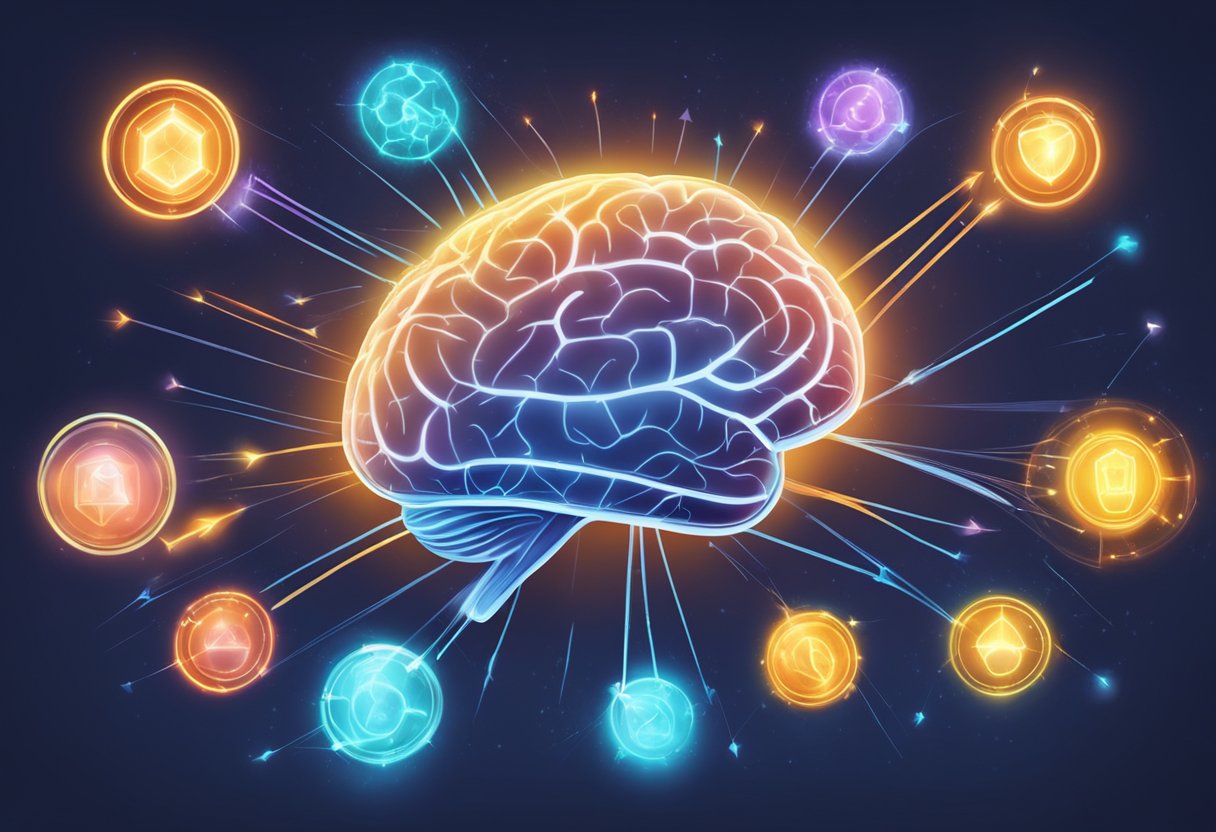Discover effective strategies in our latest article, “Forgetfulness: Tactics to Sharpen Your Memory,” and become more confident in retaining important information.
Table of Contents
Introduction – Forgetfulness
Forgetfulness, a common occurrence in daily life, often goes unnoticed until it becomes frequent enough to cause concern. It’s characterized by lapses in memory, such as forgetting names, misplacing objects, or missing appointments. While these instances are usually considered a normal part of aging, they can also indicate underlying medical conditions. Identifying the difference between normal forgetfulness and potential signs of cognitive disorders is crucial for timely intervention and management.

Distinct types of memory problems like transience, absentmindedness, and blocking affect individuals differently. The causes of memory lapses run the gamut from lifestyle factors and medical conditions to medications and psychological issues such as stress or depression. It’s essential to understand that while some memory concerns are reversible, others may require long-term management strategies or medical treatments. Strategies for preventing or controlling factors affecting memory include lifestyle adjustments, proper healthcare, and in some cases, therapeutic interventions.
Key Takeaways
- Occasional forgetfulness is part of normal aging, but can also signal deeper health issues.
- Understanding different types of memory problems is critical for addressing forgetfulness.
- Effective management includes lifestyle changes and addressing reversible causes.
Understanding Forgetfulness and Memory

As individuals age, differentiating between normal age-related forgetfulness and more serious memory disorders becomes critical for maintaining cognitive health. The intricate role of the brain in memory processes underscores the complexities of memory loss and its effects.
Defining Forgetfulness
Forgetfulness is the occasional lapse in memory that people may experience, such as misplacing keys or forgetting an appointment. Normal aging involves some degree of forgetfulness, which is typically not a cause for concern. The National Institute on Aging provides insights into the nature of age-related changes in memory.
Normal Aging vs. Memory Disorders
While normal aging brings about predictable changes in memory, such as slower recall, memory disorders cause significant impairments. Disorders like dementia impact one’s ability to perform daily activities, marking a stark contrast to age-related forgetfulness. The National Institute on Aging offers detailed comparisons between the two.
The Role of the Brain in Memory
The brain’s hippocampus is central to forming and retrieving memories, and changes in this area are often related to memory loss. It is important to understand that memory functions may decline with age, however, promoting cognitive health through an active and healthy lifestyle can help maintain brain function. Information about maintaining cognitive health can be found through resources like the Mayo Clinic.
| Key Findings | Source URL |
|---|---|
| Normal forgetfulness is part of aging; dementia is not. | NIA Memory and Aging |
| The hippocampus plays a vital role in memory, and cognitive health can be maintained through lifestyle choices. | Mayo Clinic Memory Tips |
| Related Keywords |
|---|
| Memory |
| Aging |
| Brain |
| Normal aging |
| Age-related forgetfulness |
| Cognitive health |
Common Causes of Forgetfulness

Forgetfulness can stem from a variety of medical conditions and lifestyle factors that disrupt cognitive functions.
Medical Conditions Influencing Memory
Numerous medical conditions can impact memory sharply. Depression is often characterized by impaired concentration and forgetfulness, with mood disturbances exacerbating these symptoms (Harvard Health). Thyroid issues, particularly hypothyroidism, can slow cognitive functions, leading to memory problems (Mayo Clinic).
- Medications have a recognized effect on memory, with some causing confusion or reduced recall as side effects.
- Head injuries can lead to short-term forgetfulness or long-term memory impairments.
- Vitamin B-12 deficiency is a nutritional gap that can notably affect memory (Forbes Health).
- Blood clots and infections may also compromise brain function, deterring recall abilities.
- Conditions such as kidney or cancer can contribute to cognitive deficits, including forgetfulness.
Lifestyle Factors Affecting Recall
Day-to-day habits play a significant role in cognitive health. Sleep deprivation can severely impair memory and is a common cause of forgetfulness. Stress and heavy alcohol use similarly strain cognitive resources and can lead to lapses in memory. Excessive or chronic alcohol consumption is specifically notable for its damaging effects on mental abilities, including recall (Mayo Clinic). Managing blood pressure and reducing stress through relaxation techniques can help maintain memory performance.
Key Findings
| Entity | Effect on Memory | Source URL |
|---|---|---|
| Depression | Impairs concentration | Harvard Health |
| Hypothyroidism | Slows cognitive function | Mayo Clinic |
| Medications | Can cause confusion | – |
| Head Injury | May impair memory | – |
| Vitamin B-12 | Deficiency affects memory | Forbes Health |
| Blood Clots | Can deter recall ability | – |
| Alcohol Use | Damages mental abilities | Mayo Clinic |
| Sleep Deprivation | Severely impairs memory | – |
| Stress | Strains cognitive resources | – |
Identifying and Diagnosing Memory Problems

It is imperative for individuals experiencing memory problems to understand when these issues warrant medical attention and the types of assessments that can aid in diagnosis.
When to See a Doctor
Individuals should consider seeing a doctor if they observe persistent symptoms of memory loss that interfere with daily life, such as forgetting important dates, asking for the same information repeatedly, or difficulty in performing familiar tasks. These could be signs of a medical condition and not just age-related forgetfulness. A doctor, often a neurologist, can help determine whether the symptoms suggest a condition such as a concussion, stroke, or another neurological condition.
Diagnostic Tests and Assessments
Once in a medical setting, different tests and assessments are used to diagnose the cause of memory problems. This can include memory tests, physical exams, blood tests, and brain-imaging scans. These tools help to identify reversible medical conditions or more significant concerns like dementia. Early diagnosis is crucial as it may provide access to treatment options and support services.
| Key Finding | Technique/Tool | Related Entity |
|---|---|---|
| Early signs of memory loss | Consultation with a doctor or neurologist | Memory problem |
| Identifying reversible causes | Blood tests, physical exams | Medical condition |
| Determining the extent of memory impairment | Cognitive assessments, memory tests | Diagnosis |
| Investigating neurological health | Brain-imaging scans (MRI, CT) | Neurological condition |
Links to relevant sources for more information:
| Source Title | URL |
|---|---|
| Memory Problems, Forgetfulness, and Aging | National Institute on Aging |
| Memory loss: When to seek help | Mayo Clinic |
| Age-Related Forgetfulness or Signs of Dementia? | National Institute on Aging |
| Diagnosing Memory Loss | NYU Langone Health |
Treating and Managing Forgetfulness

Effective management of forgetfulness involves both medical interventions and lifestyle adjustments that address underlying causes and enhance cognitive function. These strategies may range from medication management for related health conditions to cognitive exercises that can bolster memory and attentiveness.
Medical Treatments and Interventions
Medical strategies for treating forgetfulness, particularly when linked with conditions like Alzheimer’s disease or vascular dementia, may include medications that target cognitive symptoms. Antidepressants can also be used when forgetfulness is associated with depression. In some cases, forgetfulness could be a sign of reversible causes like vitamin deficiencies or thyroid problems, which are treatable with appropriate interventions.
Key Medical Findings:
- Medications for Alzheimer’s: Slow progression and improve symptoms.
- Treatable Conditions: Vitamin deficiencies and thyroid issues can be corrected.
Cognitive and Behavioral Strategies
Cognitive strategies often involve learning new skills and daily exercises that stimulate the brain, enhancing attention and short-term memory. Behavioral techniques include using memory tools such as calendars, notes, and to-do lists, which support managing daily activities. For those with mild cognitive impairment, these non-pharmacological interventions can be particularly beneficial.
Behavioral Tools:
- Calendars/Notes: Help keep track of important dates and tasks.
- To-Do Lists: Aid in organizing daily activities for better memory recall.
| Key Strategies | Description | Relevant Condition |
|---|---|---|
| Memory Tools | Use of aids like notes and lists to manage forgetfulness. | Mild Cognitive Impairment |
| Exercise | Regular physical activity to improve overall cognitive health. | Alzheimer’s Disease |
| Learning New Skills | Engaging in new activities to boost cognitive reserve. | Vascular Dementia |
Reference:
- National Institute on Aging
- Mayo Clinic – Alzheimer’s Disease
- Mayo Clinic – Memory Loss Tips
- Verywell Health – Forgetfulness
Prevention and Enhancement of Memory

Proactive measures and regular practice can greatly influence one’s ability to retain and recall information. This section delves into specific lifestyle choices and techniques that can help enhance memory function and reduce the risk of memory-related problems.
Lifestyle Choices and Memory
Certain lifestyle choices play a critical role in the maintenance of memory health. For older adults, maintaining a healthy diet is key; consuming fruits, vegetables, and whole grains, along with low-fat proteins such as fish and skinless poultry, has been suggested to have beneficial effects on the brain. It is also important to manage chronic health problems like an underactive thyroid or mental health conditions that could affect memory. An example of such a condition is mild forgetfulness which, while a normal part of aging, can progress if left unchecked.
Ensuring that one gets enough sleep is another pivotal aspect, as lack of sleep can lead to confusion and short-term memory loss. Alcohol consumption should be moderated since excessive intake can impede brain functions and lead to memory problems.
| Lifestyle Factor | Impact on Memory | Source URL |
|---|---|---|
| Healthy Diet | Improves brain function | Mayo Clinic |
| Manage Chronic Problems | Prevents further decline | NIH |
| Adequate Sleep | Ensures mental sharpness | Mayo Clinic |
Techniques for Improving Memory Retention
Enhancing one’s memory can also be achieved through specific techniques. Regularly engaging in brain exercises, such as learning a new skill or challenging one’s thinking abilities, can improve memory retention and cognitive function. Practicing mindfulness and relaxation exercises can alleviate anxiety, which in turn helps with recall capabilities.
Creating a daily routine and organizing living spaces can minimize the chances of forgetting everyday items like one’s wallet. Associating memories with visual images, patterns, or even physical locations can improve recall, leveraging the Method of Loci, an ancient technique.
Memory is not just about recall but also the prevention of loss. Being mindful of changes in mood or behavior, and seeking medical advice in cases of frequent confusion or memory loss can lead to early detection of serious conditions like a transient ischemic attack, brain tumor, or effects of head trauma that could impair memory. Maintaining privacy and ensuring proper blood flow through regular physical activity also contribute to a healthy brain.
| Technique | Benefit | Source URL |
|---|---|---|
| Brain Exercises | Enhances cognitive function | NIH |
| Organization | Aids in reducing forgetfulness | Mayo Clinic |
| Mindfulness | Lowers anxiety, improves memory | NCBI |
Conclusion & Key Takeaways
Forgetting daily objects like glasses or keys is a common symptom of forgetfulness. Memory loss becomes concerning when it disrupts daily life. Understanding memory and the factors that affect recall can reduce the frequency of these occurrences.
Key Findings:
- Stress and anxiety can impair memory.
- Regular mental and physical activity enhances memory retention.
- Effective tips to combat forgetfulness may include mnemonic devices and organization strategies.
Tips for Mitigating Forgetfulness:
- Organize: Keep everyday items in designated places.
- Repeat: Saying information aloud boosts memory.
- Focus: Minimize distractions to enhance concentration.
Useful Links
| Topic | URL |
|---|---|
| Dealing with Forgetfulness | How to Deal with Forgetting |
| Memory Enhancement Tips | Improving recall |
Remember, occasional forgetfulness is typical, but persistent symptoms warrant professional evaluation. Utilizing the above strategies can foster stronger memory recall and reduce instances of forgetfulness.
Frequently Asked Questions
The following Frequently Asked Questions address common concerns and provide insights into the nature of forgetfulness, touching on factors from early adulthood through to the normal aging process, and offering advice for when to seek help.
What factors contribute to increased forgetfulness during early adulthood?
During early adulthood, high stress levels, lack of sleep, and multitasking can lead to an increase in forgetfulness. These factors can impair the brain’s ability to encode, store, and retrieve memories efficiently.
Are there specific symptoms that indicate a concerning level of forgetfulness?
Symptoms that suggest a concerning level of forgetfulness include consistently forgetting important dates or events, difficulty following simple plans, and a sudden inability to complete familiar tasks. When forgetfulness disrupts daily life, it may be time to consult a professional, as highlighted by the Mayo Clinic.
How can individuals improve memory retention and reduce forgetful moments?
Improving memory retention can be achieved through regular mental exercise, such as puzzles or learning new skills, and maintaining a healthy lifestyle that includes nutritious food and adequate sleep. The Mayo Clinic recommends a balanced diet and managing chronic health conditions to aid memory.
At what point should someone be concerned about their forgetfulness?
One should be concerned about forgetfulness when it is persistent, interferes with daily activities, or causes significant changes in mood and behavior. In such cases, consulting a healthcare provider is advisable.
What are the common causes of memory lapses across different age groups?
Common causes of memory lapses include stress, fatigue, certain medications, and medical conditions. Factors such as anxiety and depression can also affect memory across different age groups.
Are age-related memory changes considered part of the normal aging process?
Yes, it is normal for age-related changes to occur, such as mild forgetfulness and slower processing speeds. This aspect of aging is often referred to as age-associated memory impairment, which is distinctly different from neurodegenerative diseases such as Alzheimer’s, and is part of healthy aging. The concept of transient memory problems as a part of normal aging is expanded upon by Harvard Health.




